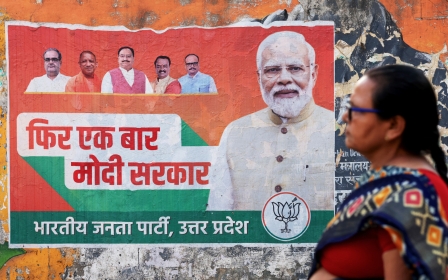Indian elections: How Kashmiri politicians are co-opting the language of resistance

While campaigning in Srinagar last month ahead of India’s parliamentary elections, People's Democratic Party (PDP) candidate Waheed Para chanted: “Let the traitors hear! Will you become like Farooq [Abdullah]? Will you become like Omar [Abdullah]?” Upon hearing the names of the two politicians, the crowd responded emphatically: “No!”
As I watched this video, the chants and their tone screamed of non-belonging. For the longest time, in spaces of resistance - in streets and alleys across Kashmir - such chants have risen to a crescendo.
Every time an act of violence has been committed by the Indian state, Kashmir has resonated with the slogan “azadi” (meaning “freedom” from Indian rule). This chant has represented joy at weddings, and commemorated martyrdom at funerals of armed fighters; it has arisen in both moments of triumph and times of despair.
Today, as the silencing of Kashmir reaches unprecedented levels, this chorus seeking freedom has embedded itself in the international lexicon, as recently witnessed during Palestine solidarity protests on US campuses.
Kashmiris use the collective affirmation of “azadi” to reject those seen as traitors to the disputed region’s fight for freedom, including members of political parties such as the PDP, National Conference and other foot soldiers of the military occupation.
Stay informed with MEE's newsletters
Sign up to get the latest alerts, insights and analysis, starting with Turkey Unpacked
As India holds its mammoth parliamentary vote, which will include the election of client politicians from Kashmir, why are establishment candidates co-opting the tone and language of pro-resistance politics?
As they seek power in a coercive state apparatus, why are they deploying language associated with the resistance movement, which opposes the very same apparatus that they seek to strengthen and legitimise?
Deception and repression
Borrowing from the work of scholars Mona Bhan and Haley Duschinski, India’s “procedural performance” of holding elections in Kashmir can be framed as an apparatus of erasure - one that seeks to uphold the facade of Indian democracy while normalising “the proceduralism of an occupying state”.
Voter turnout remains immaterial to the status of India’s settler-colonial rule over Kashmir and its lack of legitimacy. The history of India-held elections in Kashmir has been one of deception, maneuvering and the installation and dismantling at will of client regimes.
The current climate of repression and extensive use of anti-terrorism laws against human rights defenders, journalists, resistance leaders and youth have resulted in an environment where counter-narratives are criminalised and pro-freedom voices silenced.
These client politicians are busy reinforcing the Indian state's authority through electoral politics
The Indian state is seeking to rewrite history, claiming that a new era of peace has begun in the region, while working to erase any vestiges or memories of resistance.
The co-option by pro-India politicians of resistance slogans is a discursive strategy that engineers such memoricide, while also aiming to appeal to people by invoking the language of resistance. Para, for example, has referred to the elections as a referendum for people to convey their dissatisfaction with the Indian government’s decisions since 2019, when it repealed Article 370, thus removing Jammu and Kashmir’s autonomy.
This invokes the discourse of freedom, which has long relied on the promise of a referendum for the territory, to create an illusion of resistance being put up by the PDP.
Para spent more than a year in jail under an anti-terrorism law, which he says was because of his opposition to the Indian government’s decision on Article 370. He places this in the larger context of the Modi government silencing opponents, claiming to hold the fortress of resistance against the Hindu rightwing Bharatiya Janata Party.
The right to dignity
Meanwhile, Aga Ruhullah Mehdi, the National Conference’s Srinagar candidate, spoke in a recent interview about the humiliation Kashmiris face when they are forced to stop on the highway to allow the Indian army’s convoys to pass, and how Kashmiris lack the dignity of free movement.
Altaf Bukhari’s Jammu and Kashmir Apni Party, formed in 2020, has also made repeated references to seeking a dignified life for people, with little reflection on the factors preventing this. So has Sajad Lone of the People’s Conference, invoking the need for “development with dignity” in Kashmir.
The right to a life of dignity has long been at the core of the freedom struggle, because life under Indian occupation is the antithesis of this.
Various parties have blamed each other for the different phases of violence in Kashmir. Lone has targeted the National Conference for being the “dacoits of 1987” who rigged elections and “filled graveyards” in Kashmir, and he has vowed to hold the party accountable.
For his part, Bukhari has said that his opponents are hoodwinking Kashmiris when they call for the restoration of Article 370. What is left out of the debate is the role of the Indian state in administering Kashmir through violence, regardless of who holds power locally.
While these client politicians are busy reinforcing the Indian state’s authority through electoral politics, the latter has escalated its campaign of mass arbitrary detentions to facilitate “smooth” elections. This is conveniently erased from the blame game of the political contenders seeking to benefit from a system of repression.
Yet, even as the chants of “azadi” are silenced or co-opted, the Indian state and its client politicians must continually find new maneuvers to appeal to people amid growing perceptions and experiences of injustice. As they seek votes by invoking the language of resistance, they fail to acknowledge that the state responsible for disappearing, maiming, torturing, humiliating, dispossessing and dehumanising Kashmiris cannot be the source of their rights, dignity and freedom.
The views expressed in this article belong to the author and do not necessarily reflect the editorial policy of Middle East Eye.
Middle East Eye delivers independent and unrivalled coverage and analysis of the Middle East, North Africa and beyond. To learn more about republishing this content and the associated fees, please fill out this form. More about MEE can be found here.






